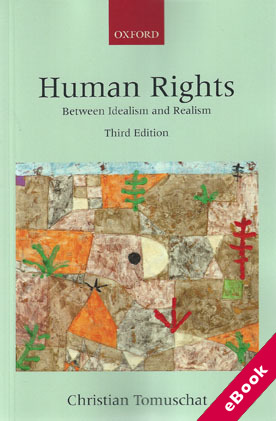
The device(s) you use to access the eBook content must be authorized with an Adobe ID before you download the product otherwise it will fail to register correctly.
For further information see https://www.wildy.com/ebook-formats
Once the order is confirmed an automated e-mail will be sent to you to allow you to download the eBook.
All eBooks are supplied firm sale and cannot be returned. If you believe there is a fault with your eBook then contact us on ebooks@wildy.com and we will help in resolving the issue. This does not affect your statutory rights.
This third edition of Human Rights: Between Idealism and Realism presents human rights in action, focusing on their effectiveness as legal tools designed to benefit human beings. By combining conceptual analysis with an emphasis on procedures and mechanisms of implementation, this volume provides a multidimensional overview of human rights.
After examining briefly the history of human rights, the author analyses the intellectual framework that forms the basis of their legitimacy. In particular, he covers the concept of universality and the widely used model that classifies human rights into clusters of different 'generations'.
In this edition, the author brings together the fundamental aspects of human rights law, addressing human dignity as the ethical foundation of human rights, the principle of equality and non-discrimination as the essence of any culture of human rights, the protections against racial discrimination and discrimination against women, and assesses the individual as a subject of international law. The volume then moves on to assess the activities of the political institutions of the United Nations, the expert bodies established by the relevant treaties, and the international tribunals specifically entrusted at the regional level with protecting human rights.
This edition also includes specific analysis of the actions mandated by the UN Security Council against Libya in 2011. It also includes greater coverage of the jurisprudence of the Inter-American Court of Human Rights and the African Commission on Human and Peoples' Rights.
The author explains how and why the classical array of politically inspired informal devices has been enriched by the addition of international criminal procedures and by endeavours to introduce civil suits against alleged individual violators of human rights. Finally, the volume is rounded off by a consideration of the importance of humanitarian law as an instrument for the protection of human life and dignity and an exploration of the future of human rights.